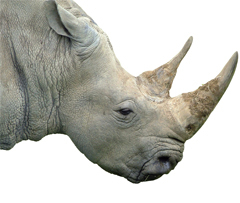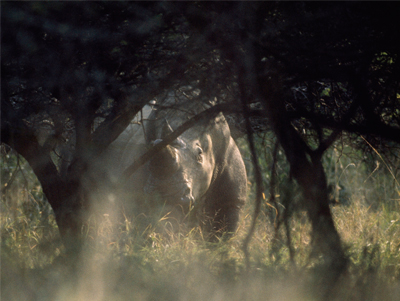
Our guide, an ambitious young Nepali, told us what to look for on our hike out into the jungle. We would be walking among close-standing trees and underbrush; we must stay together, follow him, and do exactly as he said.
I felt a secret pleasure, realizing that we would be hiking out into the wilderness as the Buddha did each day of his life as a teacher. With his great company of monks and nuns in their robes made of beggars’ rags, he roamed the forests of northern India, stopping in towns to beg for food and offer his wisdom. Surely some of his daily walks led through jungle like the one surrounding us here in southern Nepal. On our Buddhist pilgrimage we were taking a side trip to a jungle camp for tourists, where we stayed in thatch huts and listened to enthusiastic nature talks by our guide. In me stirred an inkling of the ancient presence of those enlightened men and women who might have passed here.
In preparation for our walk, our guide told us about the one danger: We could be attacked by a rhinoceros. These beasts were cantankerous and did not like incursions into their territory. They weighed over a ton, he said, and could be 12 feet long, with a vicious 2-foot horn on their noses and the capacity to run 30 miles an hour. They were known to charge without apparent reason. If they caught you, they could strike you powerfully with their horn—or gore you with it. We were to take them very seriously.
“If we see a rhino, and he sees us, and if he begins to move toward us,” instructed our guide, “all we can do to protect ourselves is climb a tree. So as we walk, make sure you are always somewhere near a tree, and if I yell, ‘Rhino!’ you go up it.” We nodded obediently.
So, we set out, six Westerners following behind a khaki-clad young man, jaunty in a pith helmet. I wondered about the reality of the threat—was our guide just offering us cheap thrills? An attacking rhino seemed so unlikely that I didn’t bother asking myself if I was afraid. I did, however, become very conscious of the proximity of each tree. And I remembered the story of the Buddha’s being attacked by a drunken raging elephant. His disciples, all but Ananda, fled in panic, but the Buddha saw that the elephant had been driven to this crazed state, and he experienced great love and pity for the animal. The elephant, feeling the power of the Buddha’s love, slowed its charge, grew gentle, and came to bow down at the Buddha’s feet. It was then that the Buddha made his famous statement to Ananda, that hatred cannot be destroyed by hatred, but only with love.
Now, in the jungle, we trudged along, our guide explaining, answering questions. I wondered if a rampaging rhino would be as susceptible to love as an elephant, and then I let go of my fantasy to listen to this eager young man. He told us the names of the trees, he showed us the signs that a big cat had passed and explained its habits. We wandered happily, a bit dusty and hot, following behind him like children on a field trip.
Then suddenly he stopped and held up his hand.
“Rhino,” he said, barely above a whisper. “Hold still, everyone. He hasn’t seen us.” I looked out through the underbrush to see a form like a small tank moving in the tall grasses. Even at this distance, I could feel viscerally how enormous that being was, how much gristle pushed it forward in a leisurely trot.
I began to tremble. I located a nearby tree.
The rhino was coming in our direction. I could see his silver-brown skin in thick folds over his body, the wart-like bumps on his shoulders, his tiny nearsighted eyes.
Our guide stiffened. Then suddenly he gave a ringing shout. “Go! Up a tree!”

The six of us, after a moment of paralysis, ran for a tree. The same tree. It was medium size, with branches low enough to climb up on. The youngest members of our group got there first and clambered up; arriving late, I scrabbled at their legs and the lower trunk, until they reached down to lift me up into the branches.
There we hung, six of us in one tree, like a pack of nervous apes, while the trunk, weighted with all these bodies, began to tilt toward the jungle floor. In a nearby tree our guide had lost his cool. He howled with laughter, pointing at us.
Meanwhile, the rhino had sighted us. He lowered his head, snorted, and charged, thundering toward us, his hoofs thumping dirt.
Someone’s elbow pushed into my face, I hugged the scratchy tree trunk with all my strength. Someone else had a death grip on my shoulder. We held our collective breath as the rhino pounded under our tree. Now we could see up close his dusky bulk, his thick, sharp horn, hear his furious growls and squeaks and grunts.
Looking down on him, I tasted dust in the back of my throat. Love, pity, I urged, but my Buddha reverie shattered and fell away, leaving only the raw vigor and vicious intention thundering there beneath us—a force so far beyond my small human agendas that it turned my gut to liquid.
Terrifyingly, our tree kept bending farther down to the earth.
The guide had to hold on tight to his tree in order not to fall out of it, as he continued to guffaw helplessly.
The monster paused, bellowed loudly, stamped his hooves, swung his enormous head.
We gripped our tragically drooping tree as time slowed almost to stasis. Would we inhabit this nightmare into eternity?
At last, flicking his tail, our pursuer turned his bulging rump and trotted away, the underbrush swallowing him like water.
I drew a breath, and began to untangle myself from the other bodies. Awkwardly, we climbed down out of our tree, which sprang back up, quivering in relief. Our guide rushed to help us, but when we stood before him, he still struggled to control his laughter. “Sorry,” he said, “I’ve never seen anything like that.”
My mind fluttered above a body that felt disassembled at the joints. And inside, a tremulous silence reigned. The other Westerners and I glanced sheepishly at each other, as we realized how ridiculous we must have looked. No one here came near the towering stature of the man in the brown robe who had wielded his redemptive love. Instead, when we found ourselves prey to a primitive, untamable force, our only concern had been to save our own skins.
I felt a foolish grin stretching my lips, and looked around to see my fellow hikers variously shaken, distressed, and amused.
Our guide set off again, and we followed, I trying to find my former equanimity, settling into a newly awakened respect for this ancient patch of earth we trod—and for the Buddha, who had so vanquished his self-clinging that he could meet a raging beast with tender concern.